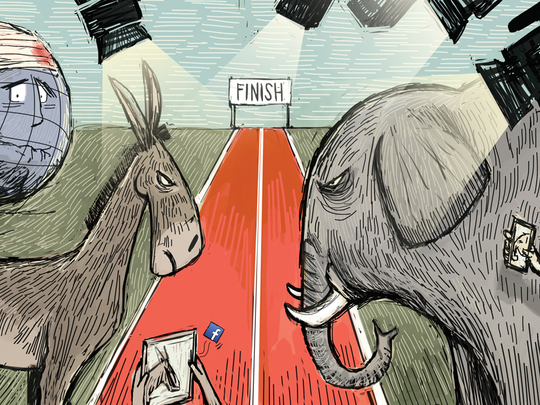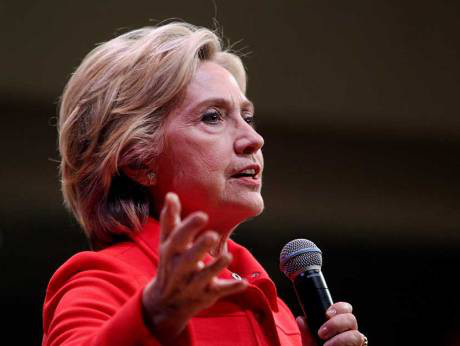
Monday’s Iowa caucuses saw former secretary of state Hillary Clinton and Senator Ted Cruz win out narrowly in the Democratic and Republican races. Both emerged top in very closely fought contests against Senator Bernie Sanders, and billionaire businessman Donald Trump respectively, with Senator Mario Rubio finishing a stronger-than-anticipated third on the Republican side and whose candidacy could now secure sizeable new momentum.
While Clinton and Cruz will be relieved by their wins, other candidates will rightly emphasise that Iowa has a mixed record of picking the eventual presidential nominees. While the last three Democrats who won the state in a contested race — Barack Obama (2008), John Kerry (2004) and Al Gore (2000) — went onto win the party’s crown, only one of the last three Republican nominees in similar competitive contests — George W. Bush (2000) — won in the so-called Hawkeye state, a fact that will be noted by Trump and Rubio. Indeed, John McCain didn’t finish in the top three in 2008, but went on to win the Republican crown.
This year’s race is therefore only in its infancy and remains potentially very volatile as it heads into the New Hampshire primary on February 9. In part, this is because of the unusually high tide of anti-politics sentiment in 2016, which is fuelling the perceived ‘insurgency’ candidacies of Sanders (who lost by a razor-thin margin against Clinton and could now win New Hampshire), Cruz, and Trump against those seen to be more ‘establishment-orientated’ like Clinton.
Another highly notable backdrop to this year’s presidential race, which potentially increases its unpredictability too, is the high salience of international issues amongst the US electorate. For instance, a Pew Research Centre Poll last month found that 34 per cent of the population believes foreign policy, especially tackling international terrorism, is the biggest challenge facing the country. By contrast, ‘only’ 23 per cent mentioned economic problems.
The higher salience of foreign compared to economic issues is unusual in the past few decades. Indeed, it resembles the first 25 years of the Cold War, from 1948 to 1972, when international security issues dominated the concerns of US voters during presidential campaigns.
By contrast, since the early 1970s, economic matters have tended to be the electorate’s highest priority. For instance, in December 2011, just before the last presidential election year in 2012, some 55 per cent of US citizens cited economic worries as the most important facing the country, according to Pew. By contrast, only 6 per cent mentioned foreign policy or other international issues.
The centrality of foreign and security policy issues in this year’s election largely reflects US concerns about terrorism. After the Paris attacks last year, and the atrocity in San Bernardino, California, almost 18 per cent of the population believed in December that the terrorist danger is the biggest issue facing the country. And an additional 7 per cent of voters asserted that Daesh (the self-proclaimed Islamic State of Iraq and the Levant) specifically (as distinct from terrorism in general), or the conflicts in Syria and Iraq, are the priority number one for the nation.
Although foreign and security policy has thus returned to the forefront of US electorate’s mind, at least temporarily, there are significant differences between now and during the first two decades of the Cold War. This earlier period was characterised by a relative policy consensus and widespread bi-partisan cooperation on foreign and security matters, whereas today this area is highly divisive area politically, as is underlined by the attacks by Republican candidates on Obama.
For instance, Trump has lambasted the Obama administration, from the nuclear deal with Iran, its handling of the relationship with Israel and Russia, and the agreement to pursue a Trans-Pacific Partnership trade agreement. Indeed, he asserts that “Obama’s foreign policy is a complete and total disaster — the worst president we have ever had”.
To be sure, the early Cold War consensus can be overstated. Nonetheless, a significant degree of bipartisan agreement on foreign affairs did exist until it broke apart in the late 1960s under the strain of the Vietnam War debacle and the demise of the notion of monolithic communism in light of the Sino-Soviet split.
No clear foreign and security policy consensus has emerged in recent years. In fact, there are clear partisan splits on a range of international issues, as Trump’s rhetoric indicates.
For instance, many Republicans and Democrats differ significantly on how they view the power and standing of the United States internationally; on the degree to which the country should be unilateralist; in their attitudes toward the campaign on terrorism and the methods by which they are being fought; and on what the main priorities of foreign policy should be. Generally, Democrats are significantly more positive about Obama’s policies and their consequences, while Republicans are largely negative.
An example here is the campaign against Daesh, where both Trump and Cruz have called for more much hard-line actions. In Iowa recently, for instance, the latter called for a “fundamentally different military strategy” of “carpet-bombing [Daesh] into oblivion”. Meanwhile, Trump has said he would “bomb the [expletive] out of ‘em there would be nothing left”.
This has not only been criticised by some Democrats, but also the US commander in charge of the Iraq-Syria theatre. Lieutenant General Sean McFarlane asserts that such proposed “indiscriminate bombing…is just inconsistent with our values”.
Given the differences, and the large stakes in play, many international audiences are showing a keen interest in the 2016 election. Indeed, it is possible that the global focus on the race could be even higher than 2012 when, according to a Pew Global Attitudes Project report, more than a third of populations in countries as diverse as Britain, Germany, Jordan, Lebanon, China, India and Japan where either “closely or somewhat closely” following the presidential campaign.
Barring a significant economic downturn in 2016, it is likely that the current high salience of foreign and security issues will remain a central aspect of politics for the rest of the election year. And the partisan splits on these topics will reinforce high rates of political polarisation in the electorate.
Taken overall, foreign policy and security issues are thus likely to maintain their salience in this year’s US election, especially if there are further terrorist attacks on the US homeland. Partisan divisions have prevented the establishment of a foreign policy consensus in recent years, and the gaps between the parties on these issues may only widen in this election year.
Andrew Hammond is an Associate at LSE Ideas (the Centre for International Affairs, Diplomacy and Strategy) at the London School of Economics.











